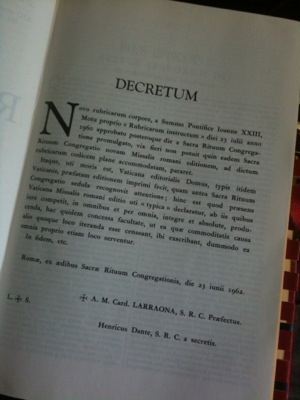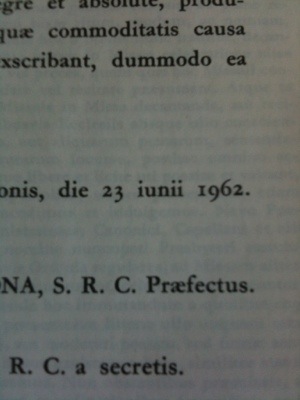Today is the 52th “birthday” of the 1962 Missale Romanum!
Spiffy!
And because it is the Vigil of my Name Day, I shall enjoy a cigar from a box of small Macanudo from one of you readers (a priest, as a matter of fact, and not one whom you might immediately suspect). I shall also have to have an adult beverage in honor of this festive occasion! I don’t have the customary witch to burn in effigy, alas, for this Vigil. The cigar will have to do.
Keep in mind that if today is anniversary of promulgation, then tomorrow could be the anniversary the Missal’s own “First Mass”. If it was signed and promulgated on 23 June, then it came into force after most priests in Rome had said their morning Masses. Thus, today could have been the first day of its use.
Also, in 1962, 24 June was a Sunday. It seems appropriate that St. John XXIII would want his Missal to go into force on a Sunday which was also the Feast of the Nativity of John.




































Considering it replaced a form of the Roman Missal superior to it (the old double/semidouble/simple rankings, the redundant Confiteor, the secondary feast days of saints, etc.) I myself will hold off.
However, it is the very best legal version of the Roman Mass we can celebrate. To that, we should drink.
If you want a witch to “burn in effigy” father, you might consider adding these to your wish list: http://www.cigarsinternational.com/cigars/11197/gurkha-red-witch/
Happy Name Day, Father!
I just finished a Demontreville silent retreat. You might want to comment on the value of retreats some time.
Alas, if only the 1962 Missal lacked the taint of Bugnini.
The would be nice if the pre-1962 version — mine’s a 1952 Sheed & Ward with readings from the Knox translation of the Bible — were recognized with such calendar changes and such as are appropriate. Sadly, anything Bugnini touched has an asterisk on it.
To be fair, semidouble was suppressed by Pius XII in 1955, so St. John didn’t get rid of that. And, Pius suppressed other octaves as well, including Epiphany.
While some of the rest of y’all are disputing, I hope in a few hours to be celebrating this event the best way I know how: by following my 1962 Missal as I give thanks for being able to exercise the blessed privilege of assisting at the Mass of the Ages.
But, if I recall correctly, it wasn’t until November that St Joseph’s name was added to the Canon, thus completing what we now know as the 1962 Missale Romanum.
Some recent printings still omit St. Joseph’s name, and apparently even some prefaces. I don’t know why, and I just stick to what’s printed until I’m instructed otherwise.
I do find myself liking very much what I read about the pre-1962 Missale and Calendar. I think the ‘Bugnini taint’ is a bit overstated but anything from the 1920-1954 has a definite appeal.
From A rare and meaningful ordination at Saint Henry’s Cathedral in Helsinki, Finland, by Alberto Carosa:
Among the recent positive developments of Catholicism in the Northern countries, Deacon Anders Hamberg was ordained a priest on Saturday, June 7th, as only the sixth Finnish-born Catholic priest since the Reformation. The ordination took place in Saint Henry’s Cathedral in Helsinki, in both Swedish, the mother tongue of Fr. Hamberg, and Latin, and was celebrated by the Bishop of Helsinki, Msgr. Teemu Sippo S.C.I. Father Hamberg had been ordained a deacon by Bishop Sippo on September 28, 2013, again in Saint Henry’s Cathedral.
I was well aware of this and other developments in Finnish Catholicism, including the opening of its first Catholic church last May in Kuopio, the capital of the Savo region in central Finland. But what I was not aware of until recently was that the newly ordained priest, Father Hamberg, would celebrate his first Mass on the day following his ordination, June 8, Pentecost Sunday, in the old rite—as a Missa Cantata according to the Missale Romanum of 1962. And that celebration also took place in the cathedral in Helsinki, with the blessing of Bishop Sippo. A Mass in the extraordinary form of the Roman Rite is already celebrated in the cathedral at least once a month, whenever a priest is available.